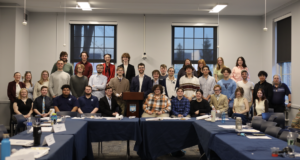The University of Maine Graduate Workers (UMGWU) advocates for the rights of graduate students through administrative bargaining. Its primary objectives are to improve healthcare, establish fair wages and increase access to housing. The terms of these negotiations seek to improve the quality of life across a struggling population.
The organization submitted over 20 proposals. Based on a survey taken by the majority of graduate workers at UMaine, 512 people voted in favor of the union and one person voted against it. Individuals from a variety of organizations strongly support UMGWU efforts.
International Student Paula Castiblanco is a graduate worker with a master’s degree in ecology and environmental science. She was invited to the first organizing committee meeting and soon became involved. Castiblanco believes in what the UMGWU fights for and considers affording food, housing and healthcare to be the “lowest of bars possible.”
The University of Maine System (UMS) claimed to voluntarily accept the union when members provided hundreds of signatures. The bargaining team was formed in 2023 and has been in negotiation with the UMS bargaining team since November 2023. Over 10 sessions have been held and 19 out of 21 proposals remain outstanding.
“We send out a list of proposals and they show up with counter-proposals when they show up. Then, our team has counters back. They have gone back and forth on more than the two that have tentative agreements,” said Castiblanco. “We won’t sign a contract until all of the proposals have tentative agreements. They say that once we have a proposed contract, it has to be approved by the Chancellor and the Board of Trustees.”
UMGWU met with leaders of the UMaine System (UMS) for a total of 10 hours on April 10 and 11 directly following a fair contract rally. According to Castiblanco, UMS brought private security to the in-person negotiations at the Ferland Engineering and Design Center. Another negotiation session took place on April 24. Beforehand, UMGWU peacefully picketed outside of Estabrooke Hall, where Chancellor Dannel Malloy’s office is located.

Efforts will continue into next semester. UMGWU seeks more testimonials, as the basis of the union is built off the experiences of graduate student employees.
“Right now, we really just want to get that first contract signed and we represent all of the University Maine System. So, it is not only the Orono campus,” said Castiblanco. “There is steady turnover every semester. I am sure when new people arrive, we will introduce ourselves and ask how they are and what they need and tell them what we do. Building community is really important to us.”
A failure by UMS to sign the contract poses a significant risk to current and future graduate workers, according to Castiblanco.
“A lot of us live in housing insecurity and food insecurity,” said Castiblanco. “Every day that goes by without a contract is a day that we all face hardships.”
Proposals to protect international graduate workers’ rights and prevent discrimination, bullying and harassment are pending. The current terms only apply to illegal harassment and discrimination. Gender identity and sexual orientation are not protected under Title IX.
“There is a real possibility that Donald Trump is going to be [the U.S.] President again. Some of the protections for international grad workers were just “Make sure that if ICE shows up, they [international graduate workers] have their paperwork in order before you [UMS] start giving out our names,” said Castiblanco.” “They refused to engage with that proposal for a long time.”
Individuals, including undergraduate students and faculty members, can support the cause by attending massive actions, such as rallies.
“Improving our conditions as graduate workers improves the University as a whole. It’s really hard to concentrate on your research when you are trying to see if you have enough food to make it through the end of the month,” said Castiblanco.
The most recent bargaining update is from the April 10 and 11 session and concerning appointments, appointment security and job postings. UMGWU hopes to increase appointment transparency by mandating employment periods of nine months or longer for stipend graduate worker positions.
Graduate workers require job security to make long-term plans. UMGWU believes the commitment should be for at least one year, though it is not unheard of for institutions to seek out external internships or other employment options over the summer months. In the proposal, appointments are not tied to specific duties and graduate workers may serve in other roles.
Another term of the proposal includes a 16-week minimum appointment for hourly graduate workers to serve the entire semester. It modifies the structure of hourly work with a standardized minimum length.
The most progress thus far was made in the UMGWU workspace and materials proposal, which guarantees access to supplies and equipment. Regarding the issue of teaching assistant cut lines across the system, UMS emphasized that departments are held to their budgets and department heads have the final say.
A proposal tracker is available on the UMGWU website. Current outstanding contracts that the Union is next to propose on include academic freedom, discipline and dismissal, employment files, grievance and arbitration, health and safety, union security, the union-management committee training, travel and job posting. UMS must respond to proposals for appointment security, appointments, employee assistance program, international graduate worker rights, non-discrimination, bullying and harassment, workspace and materials, titles and classifications, union access and rights, subcontracting and workload.
“I would emphasize that UMaine works because we work and they would not be able to have the quality of education that they want to offer without the graduate workers,” said Castiblanco. “We need recognition and we need respect and we need security in our lives. That means fair compensation for work and good health insurance.”









